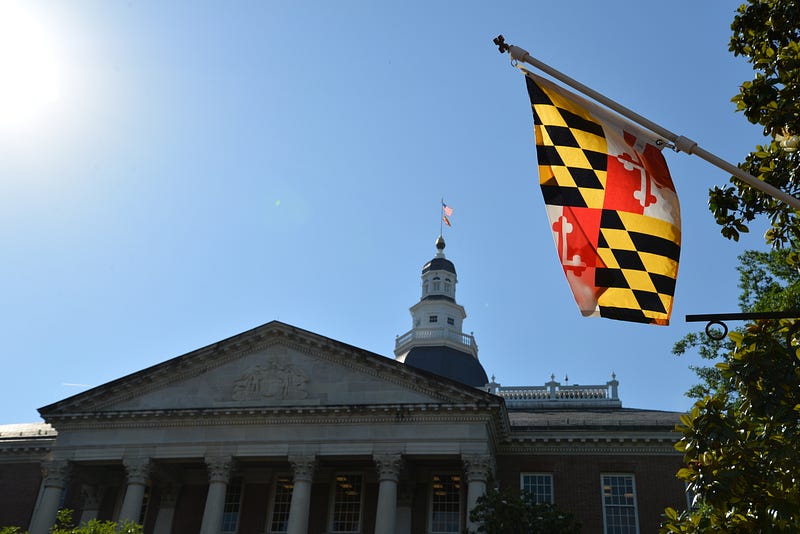The 2019 Legislative Session Begins
Our fight to end the underfunding of our schools kicks into a higher gear

OPENING DAY IN ANNAPOLIS
The 439th Maryland General Assembly session convened at noon on Wednesday, January 9, 2018. This is the first year of a four-year term for all 188 delegates and senators and there are quite a few new faces. In the Senate, 17 of 47 members are freshmen. In the House, 44 of 141 delegates were sworn in for the first time. It was hard not to notice on Wednesday that women winning office were the driving force behind the change. More than half of the newly-elected lawmakers are women, bringing the total to a record number of 72 in the General Assembly (the previous record was 67).
While first sessions can start off slow (as everyone learns the office building tunnels and how the legislative process works), there is still an enormous amount of progress to make. As always, Up the Street will be here to deliver updates and issue calls to action.
MSEA LEGISLATIVE PRIORITIES
We were all expecting the legislature to take up and vote on a new school funding formula in 2019. As we wrote about last week, that won’t happen in the months ahead. But that only makes the next 87 days of the legislative session that much more important. We need to lock in a commitment to the Kirwan Commission’s work this year and set the stage for the funding formula and corresponding pay-fors as soon as possible. Of course, there are other important priorities in addition to the Commission’s work. Here are MSEA’s legislative priorities for the 2019 session:
Kirwan Commission and School Funding
Just because a vote on the funding formula is delayed does not mean Kirwan’s funding plan needs to be delayed. Wait, huh?
Here’s why: The Commission is recommending that the legislature increase education funding by as much as $325 million on top of current funding formulas for purposes including a 3% teacher salary raise (above normal step increases and COLAs), expanded pre-kindergarten, a scaling up of community schools in areas of concentrated poverty, and more funding for special education. That funding would essentially implement Year 1 of the Kirwan Commission’s ten-year plan. And it’s paid for by $200 million set aside in last year’s budget and $125 million generated from passing Question 1 in November — the ballot question that requires casino revenue to supplement education funding, not supplant it (Fix the Fund!). This is essential.
But the legislature should not stop there. Even if the General Assembly passed a new funding formula this year, it would not start mandating funding levels until the following legislative session (in the FY2021 budget). Without taking on that enormous political lift, the legislature can still mandate funding levels for FY2021 so the implementation of Kirwan stays on schedule. According to the most recent estimates by the Commission, Year 2 of Kirwan calls for a $1.5 billion increase and is expected to be split roughly 50–50 between state and local funding (making the state’s share around $750 million). If the legislature requires the governor and itself to include that funding in the FY2021 budget next year, there’s actually no delay in the Kirwan Commission even if its work continues beyond this session. The Baltimore Sun endorsed this strategy in an editorial this week.
As part of this effort, MSEA will be working with legislators to reintroduce legislation guaranteeing a living wage for all school employees. According to Department of Legislative Services analysis, more than 24,000 education support professionals dedicating their careers to the education of our children do not make enough money to support their families. They work second and sometimes third jobs to make ends meet. As the legislature takes on the work of filling funding gaps in our schools, it must dedicate new funding to treating these public servants with the respect and dignity of making a living wage.
Other Public Education Priorities
Educators are also focused on rejecting the privatization of our public schools; increasing educator voice in school decision-making; making Maryland a more affordable place to live, raise a family, and retire; and supporting children outside the classroom just as much as we do inside the classroom.
That’s why MSEA will work hard to end the failed BOOST private school voucher program and defend Maryland’s strongest-in-the-nation charter school law; reintroduce and pass legislation adding two current public school teachers to the State Board of Education; support coalition efforts to raise the minimum wage to $15 an hour, bring down the cost of prescription drug prices, and pass paid family leave; and end the school-to-prison pipeline and institutional racism that contribute to inequality in our education system and society.
March for Our Schools

These priorities only become victories if we show up and fight for them with everything we have. That’s why MSEA is working with partners to plan the March for Our Schools on March 11, where thousands of educators, parents, students, and public education advocates will descend on Annapolis to demand action on the Kirwan Plan to eliminate the underfunding gap holding back our schools. The average school in Maryland is underfunded by $2 million every year — driving up class sizes, overwhelming the caseloads of school counselors, psychologists, and special educators, creating a shortage of paraeducators, stagnating educator salaries and increasing staff turnover, and starving schools in areas of concentrated poverty of critical wrap-around services. Our kids can’t wait. They need action now.
RSVP here today and then commit to recruiting friends, family, and coworkers to join you.
NEWS AND NOTES
Senate President Miller Announces Prostate Cancer Diagnosis
Yesterday, Maryland Senate President Mike Miller (D-Calvert, Charles, and Prince George’s-District 27) made the difficult announcement that he is undergoing treatment for prostate cancer but vowed to continue leading the Senate during session. According to his office, the cancer has metastasized and Miller will continue chemotherapy treatment over the next few months. MSEA joins the entire General Assembly and state government community in supporting the Senate President as he fights this battle.
Hogan, Legislative Leaders Differ on Use of Fix the Fund Money
On Wednesday, Gov. Hogan, Senate President Miller, and House Speaker Michael Busch (D-Anne Arundel-District 30A) continued the opening day tradition of speaking with longtime radio host Marc Steiner during the Annapolis Summit. Each spoke at length about education funding and the Kirwan Commission, quickly drawing lines in the sand for how to best utilize new casino revenue set aside for education. Gov. Hogan repeated his proposal to use all of the funding in the next five years for school construction, while the Speaker and Senate President said the vast majority of it would go to paying for the Kirwan Commission recommendations (with some going to increased school construction). How that difference of opinion gets settled will dictate how much funding goes to implement Year 1 of the Kirwan funding plan.

